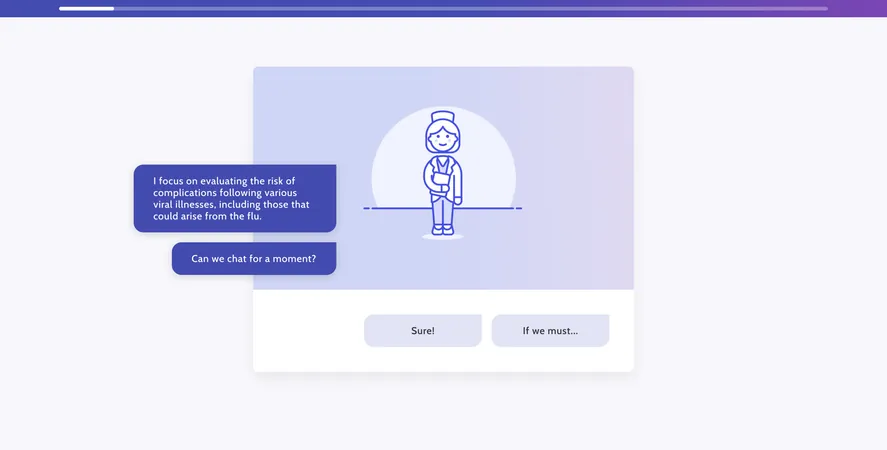
Unlocking the Future of Vaccination: Can a Virtual Nurse Change Your Mind?
2025-05-09
Author: Li
Imagine having a conversation about vaccination without stepping foot in a clinic! A groundbreaking study from SWPS University reveals that a virtual nurse can effectively persuade individuals to embrace vaccination. As public health efforts pivot to combat vaccine skepticism, exploring innovative ways to educate the masses has never been more crucial.
Despite widespread consensus among medical experts that vaccines are one of humanity's greatest achievements, skepticism lingers. The COVID-19 pandemic magnified the challenges faced by vaccination efforts, notably amid an explosion of misinformation and the rise of anti-vaccine sentiments. In this digital age, falsehoods can spread like wildfire, overshadowing the truth.
Alarmingly, while only a minority outright reject vaccines, a vast number harbor doubts about their safety and efficacy. With the resurgence of diseases previously thought eradicated, such as measles, the stakes are high; we must tackle conspiracy theories and misinformation head-on to foster trust in science and safeguard public health.
A Virtual Solution to a Real Problem
Enter FLORA, a cutting-edge app designed to simulate conversations around health and vaccination. Researchers propose that utilizing a virtual avatar for dialogue could be a game-changer, particularly given the overwhelming workloads that keep healthcare professionals from engaging patients in lengthy discussions.
FLORA focuses on influenza, a virulent threat to public health. The app facilitates discussions about the flu vaccine, crucial for protecting vulnerable populations, including children, pregnant women, and those with chronic health issues.
Innovative Research Unveils Compelling Results
In a riveting experiment with 903 participants, researchers assessed the influence of the virtual interaction on vaccine willingness. The findings were eye-opening: those who conversed with the virtual nurse not only reported feeling less at risk for post-influenza complications but were also significantly more inclined to get vaccinated.
In a follow-up with 870 participants, the impact of a direct request to vaccinate post-conversation was staggering—boosting willingness to get the shot by a whopping 33 times compared to other methods.
Empathy in the Digital Age
While the virtual dialogue itself had its merits, the study emphasizes that a direct prompt can dramatically shift attitudes. Yet, factors like personal biases or the perceived credibility of the virtual nurse could also play significant roles.
As demands on doctors' time continue to increase, FLORA represents a promising tool that could empower healthcare providers, blending empathy with efficiency. In an era where patients desire compassion and clear communication, virtual solutions may help bridge the gap, ensuring that vital health conversations continue despite time constraints.
The implications of this research are vast, pointing not just to enhanced vaccination rates but also crucially to the potential for rebuilding trust in healthcare systems through innovative digital strategies.



 Brasil (PT)
Brasil (PT)
 Canada (EN)
Canada (EN)
 Chile (ES)
Chile (ES)
 Česko (CS)
Česko (CS)
 대한민국 (KO)
대한민국 (KO)
 España (ES)
España (ES)
 France (FR)
France (FR)
 Hong Kong (EN)
Hong Kong (EN)
 Italia (IT)
Italia (IT)
 日本 (JA)
日本 (JA)
 Magyarország (HU)
Magyarország (HU)
 Norge (NO)
Norge (NO)
 Polska (PL)
Polska (PL)
 Schweiz (DE)
Schweiz (DE)
 Singapore (EN)
Singapore (EN)
 Sverige (SV)
Sverige (SV)
 Suomi (FI)
Suomi (FI)
 Türkiye (TR)
Türkiye (TR)
 الإمارات العربية المتحدة (AR)
الإمارات العربية المتحدة (AR)